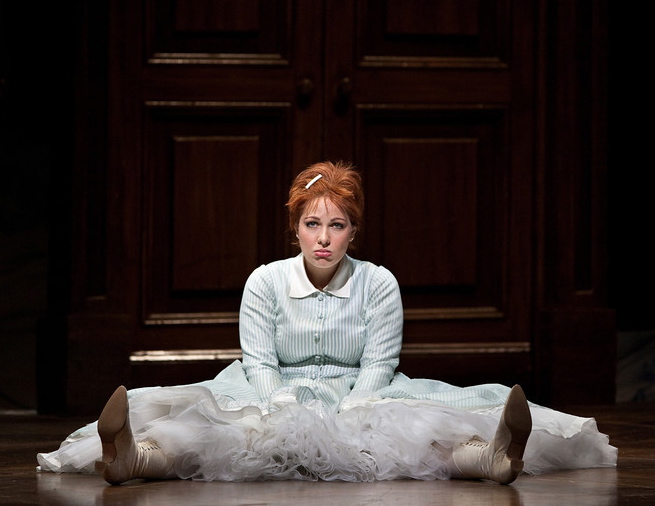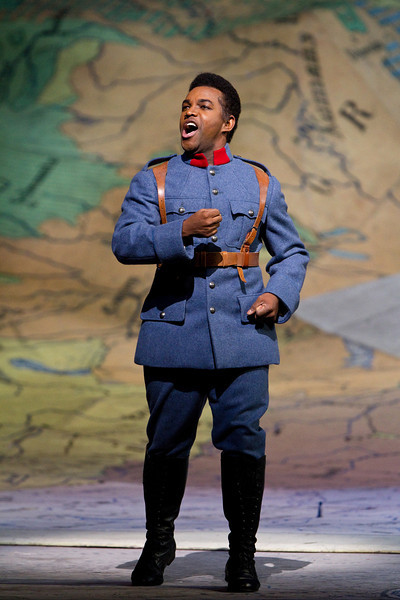Fine vocalism and goofy charm make for an enjoyable “La Fille” at the Met

Nino Machaidze as Marie in Donizetti's "La Fille du Régiment." Photo: Marty Sohl/Metropolitan Opera
Somewhere along the line, opera got the reputation of being a very serious art form.
But, as we are reminded by the Met’s sparkling production of Donizetti’s La Fille du Regiment, amid all of the genre’s dramas and tragedies, it’s also good to have a light-hearted evening at the opera with a romantic comedy. With its simple plot arc of love, conflict and happy resolution, kooky antagonists and endearing heroes — and peppered with some magnificent coloratura fireworks, including nine high C’s — La Fille gives us the 19th-century operatic equivalent of a contemporary “RomCom.”
The Met’s revival of Daughter of the Regiment, which opened Monday night, features a vocally worthy and comedically inspired cast, and proved delightful enough to sway even the stodgiest audience member.
Donizetti’s comedies offer a mix of the bel canto fireworks of Rossini and an anticipation of Verdian majesty with a touch of Gilbert and Sullivan humor. La Fille may be one of Donizetti’s best-known operas, but it is largely famous for Ah mes amis, the “Mount Everest” of tenor arias with its nine high C’s.

Lawrence Brownlee as Tonio in Donizetti's "La Fille du Régiment." Photo: Marty Sohl/Metropolitan Opera
Lawrence Brownlee delivered a magnificent rendition of the star-making aria, which famously catapulted a young Pavarotti to fame in the Met’s 1972 production. As the love-struck Tonio, Brownlee’s tone was full and even throughout, providing a bravura delivery of the Act 1 show-stopper. The tenor was also endearingly awkward in his lederhosen as he professes his love of Marie, the adopted daughter of the resident French soldiers, his vocal triumphs even more satisfying coming from this underdog character.
But, despite the renown of that famous aria, the show really belongs to Marie, who was enthusiastically portrayed and compellingly sung by Nino Machaidze. The Georgian soprano was spunky and appropriately tom-boyish, managing to bring dramatic interest to the regimental battle cry of the Act I Chacun le sait, turning the potentially sing-songy aria into an acrobatic display of comic gold.
Her voice, full and rich for a coloratura, proved particularly effective in her more active moments, though one wished for a bit more projection during the intimate, legato passages, such as her aria, Il faut partir. It is this contrast in the character that makes Marie such a difficult role, but Machaidze largely succeeds in switching credibly from hyperactive adolescent to a lamenting lover. Confident enough in her character to carry off a Pippi Longstocking-esque wig, her giddy enthusiasm over Tonio was infectious. Their characters were so complementarily awkward that it was easy to believe that these two misfits would fall in love.
Mezzo-soprano Ann Murray was hilarious as the Marquise de Berkenfield, implementing expertly understated comic timing. From her first entrance onto the Tyrolean fields with her butler Hortensius — an aptly stuffy James Courtney — Murray owns the stage and draws your attention without demanding it. Extra props to her for actually playing the piano during her voice lesson with Marie in Act II. Her chest voice in reminiscent of a Broadway belt at times, but for this character, it works, especially when backed up by a chorus doing a number that could have been plucked from Oklahoma.
Maurizio Muraro, as Sulpice, Marie’s sergeant and adoptive father (one of many), possesses an imposing bass-baritone and plays well off of his cast-mates. One only wishes that they might have made more out of the potential love-affair between the sergeant and the Marquise, since the two would certainly have pulled it off.
Dame Kiri Ti Kanawa lends her majestic presence to the role of the Duchess of Krakenthorp in a performance that is refreshingly self-deprecating, despite some awkward inserted English dialogue falling flat. The role is usually only spoken, but she allowed us to hear a few measures of her famed soprano as she sings along with the ensemble.
The Met Chorus deserves accolades for its fearless, if sometimes imperfect, execution of Laura Scozzi’s choreography. It was sometimes unclear whether the soldiers were avoiding enemy fire or just falling on the ground drunk, yet the ensemble moments generally added to the lighthearted nature of the piece, including some Fosse-esque jazz hands and the geriatric chorus that attends Marie’s groom-less wedding.
Though some have criticized Laurent Pelly’s 2008 production, the somewhat revisionist staging served the opera well. The two extremely large postcard-like drops that appeared at climactic points of the piece proved something of a misfire (the “French” rooster in the finale eliciting an almost audible “Hunh?” from the audience). The map-based topography of Chantal Thomas’s set provides interest to the eye, though you almost expected a red line, a la Indiana Jones, to appear as they traverse the countryside.
Yves Abel conducted eloquently, guiding the orchestra through the contrasting feminine and regimental sounds with buoyancy and enthusiasm. Smaller roles were performed admirably by Mark Persing, Roger Andrews and Jack Wetherall.
La fille du regiment runs through Jan. 6. www.metoperafamily.org
Posted Dec 13, 2011 at 2:07 pm by david walker-price
I was there last night (desperately trying to suppress memories of Joan Sutherland with both Pavarotti and Kraus, and Beverly Sills) thinking that here is another new production that didn’t need to happen. Nothing special or noteworthy, much just incomprehensible— e.g., awkward sets, floating giant postcards, period laundry scene with modern iron, unconnected chorus mostly bumping into one another either by accident or design…who could tell?
The singing was all more than acceptable but the standouts were the character roles taken by Ann Murray and Dame Kiri.This opera needs big peronalities, not just good singers otherwise the action, the spoken dialogue doesn’t help and bogs down. Machaidze had some wonderful moments and worked very hard but was ultimately short on star power as was Brownlee who checked his personality at the stage door.This was a workaday performance of a dreary production of an opera which can only sparkle when inhabited with the light touch of heavy hitters.